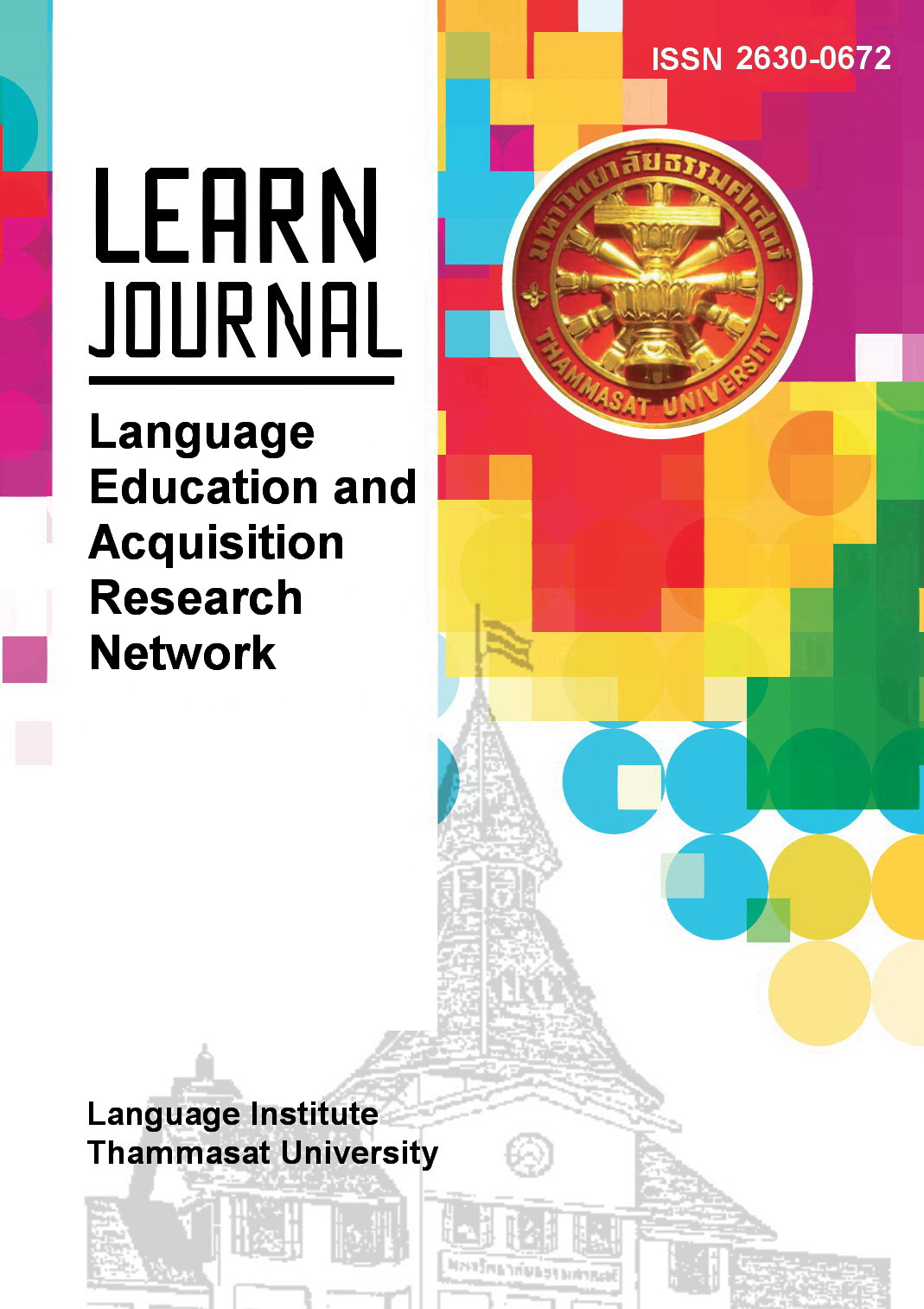Effects of Integrated Performance Assessment Modules on English Speaking Ability of Thai EFL Undergraduate Students
Main Article Content
Abstract
Integrating assessment into speaking instruction has been a challenge for English language instructors. The Integrated Performance Assessment (IPA), proposed by the American Council on the Teaching of Foreign Languages (ACTFL) (Adair-Hauck et al., 2015), is an assessment protocol featuring three modes of communication: interpretive, interpersonal, and presentational, to reinforce second and foreign language learning. This present mixed-method research aimed to investigate the effects of the IPA modules on Thai EFL undergraduate students’ speaking ability. Three IPA modules were taught over the course of nine weeks to 33 Thai EFL undergraduate students enrolled in an English speaking course, and the students’ performance was assessed using an adapted IPA rubric. The research instruments included a pretest, a posttest, unit tests, an IPA opinion questionnaire, and a semi-structured interview protocol. The findings indicated that the implementation of three IPA modules had a positive effect on students’ speaking ability as evidenced by the posttest results. In addition, the findings obtained from the IPA opinion questionnaire and the semi-structured interview protocol yielded further evidence of positive effects of the IPA, particularly on students’ perceived speaking improvement. Based on the study findings, it is suggested that the three IPA modules can be used as an instructional and assessment model to promote students’ speaking ability as well as to elicit insights into how English language teaching and assessment can be seamlessly integrated.
Article Details
References
Adair-Hauck, B., Glisan, E. W., Koda, K., Swender, E. B., & Sandrock, P. (2006). The Integrated Performance Assessment (IPA): Connecting assessment to instruction and learning. Foreign Language Annals, 39(3), 359–382. https://doi.org/10.1111/j.1944-9720.2006.tb02894.x
Adair-Hauck, B., & Troyan, F. J. (2013). A descriptive and co-constructive approach to integrated performance assessment feedback. Foreign Language Annals, 46(1), 23–44. https://doi.org/10.1111/flan.12017
Adair-Hauck, B., Glisan, E. W., & Troyan, F. J. (2015). Implementing integrated performance assessment. American Council on the Teaching of Foreign Languages.
American Council on the Teaching Foreign Language (ACTFL). (2011). 21st century skills map. Retrieved December 12, 2019, from https://www.actfl.org/sites/default/files/resources/21st%20Century%20Skills%20Map-World%20Languages.pdf
American Council on Teaching Foreign Languages (ACTFL). (2012). ACTFL Proficiency Guidelines 2012. Retrieved October 3, 2019, from https://www.actfl.org/publications/guidelines-and-manuals/actfl-proficiency-guidelines-2012
Atagi, R. (2011). Secondary teacher policy research: Secondary teachers in Thailand. UNESCO.
Brown, H. D. (2004). Language assessment: Principles and classroom practices. Pearson Education.
Center for Advanced Research on Language Acquisition (2019). Integrated Performance Assessment (IPA). Retrieved December 10, 2019, from https://carla.umn.edu/assessment/vac/CreateUnit/p_2.html
Davin, K., Troyan, F. J., Donato, R., & Hellman, A. (2011). Research on the Integrated Performance Assessment in an early foreign language learning program. Foreign Language Annals, 44(4), 605–625. doi: 10.1111/j.1944-9720.2011.01153.x
Frank, J. (2012). The roles of assessment in language teaching. English Teaching Forum, 50(3), 32.
Goh, C. C. M., & Burns, A. (2012). Teaching speaking: A holistic approach. Cambridge University Press.
Glisan, E. W., Uribe, D., & Adair-Hauck, B. (2007). Research on Integrated Performance Assessment at the post-secondary level: Student performance across the modes of communication. Canadian Modern Language Review, 64(1), 39–67. doi: 10.3138/cmlr.64.1.039
Kissau, S., & Adams, M. J. (2016). Instructional decision making and IPAs: Assessing the modes of communication. Foreign Language Annals, 49(1), 105–123. https://doi.org/10.1111/flan.12184
Kurniawan, I., Sabaruddin, S., & Lubis, A. A. (2022). The implementation of the integrated performance assessment (IPA) model to improve English students’ speaking skills. JOALL (Journal of Applied Linguistics and Literature), 7(2), 432–443. https://doi.org/10.33369/joall.v7i2.20860
Madison, S. (2019). Integrated Performance Assessments: A review of the literature and steps to move forward. Spanish and Portuguese Review, 5, 99-111.
Madison-Harris, R.D., Muoneke, A., & Times, C. (2012). Using Formative Assessment to Improve Student Achievement in the Core Content Areas. Briefing Paper.
Mertler, C. A. (2017). Classroom assessment: A practical guide for educators. Routledge.
Mueller, J. (2005). The authentic assessment toolbox: Enhancing student learning through online faculty development. Journal of Online Learning and Teaching, 1(1).
Nakhalah, D.A. (2016). Problems and difficulties of speaking that encounter English language students at Al Quds Open University. International Journal of Humanities and Social Science Invention, 5(12), 96-101.
National Standards in Foreign Language Education Project (NSFLEP). (1996). Standards for foreign language learning in the 21st century (SFLL). Allen Press.
National Standards in Foreign Language Education Project (NSFLEP). (1999). Standards for foreign language learning in the 21st century (SFLL). Allen Press.
National Standards in Foreign Language Education Project (NSFLEP). (2006). Standards for foreign language learning in the 21st century (SFLL). Allen Press.
Sandrock , P. (2008). Integrated Performance Assessment. Retrieved July 5, 2019, from http://depts.washington.edu/mellwa/Events/20081105/sandrock_ipa_handout.pdf
Sternberg, R.J., & Grigorenko, E.L. (2002). Dynamic testing: The nature and measurement of learning potential. Cambridge University Press.
Tunstall, P., & Gipps, C. (1996). Teacher feedback to young children in formative assessment: A typology. British Educational Research Journal, 22, 389–404.
Viengsang, R., & Wasanasomsithi, P. (2022). Effects of a learning-oriented reading assessment model on Thai undergraduate students’ reading ability. LEARN Journal: Language Education and Acquisition Research Network, 15, 709–747.
Zapata, G. C. (2016). University students’ perceptions of Integrated Performance Assessment and the connection between classroom learning and assessment. Foreign Language Annals, 49(1), 93–104. doi: 10.1111/flan.12176


